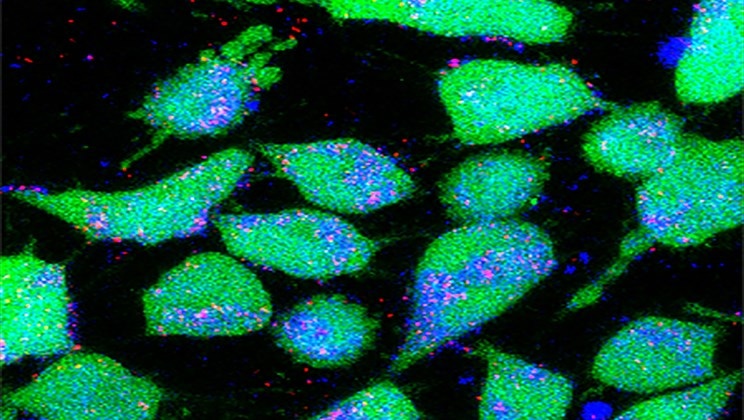Sep 21 2016
 Image of cancer cells (green) taking up fluorescently labeled nanoparticles (red), demonstrating the possibility of more efficient delivery of traditional cancer drugs. Photo credit: Image by Eric Song
Image of cancer cells (green) taking up fluorescently labeled nanoparticles (red), demonstrating the possibility of more efficient delivery of traditional cancer drugs. Photo credit: Image by Eric Song
Sticky nanoparticles capable of delivering drugs specifically to their targets and then remain there could be extremely useful in the fight against uterine and ovarian cancers.
Researchers at Yale discovered that a treatment using bioadhesive nanoparticles loaded with a potent chemotherapy drug was highly effective and less toxic than traditional treatments for gynecological cancer. The results of the research, led by Professor Mark Saltzman at the Yale School of Engineering and Applied Science and professor Alessandro Santin at the Yale School of Medicine, appear in the Proceedings of the National Academy of Sciences on September 19.
The nanoparticles are embedded with a drug called epothilone B (EB) and injected into the peritoneal space, the fluid of the abdominal cavity. EB has been used in clinical trials to target tumor cells resistant to traditional chemotherapy agents.
The drug was effective during these trials, however they caused harsh side effects as the drug had high toxicity, which prevented further use.
The Yale Cancer Center researchers’ treatment greatly decreases the toxicity of the drug by embedding it in a nanoparticle that slowly dispenses the drug in high concentration at the cancerous tumor. The issue with traditional nanoparticles is that they are cleared away from the target area too quickly to make much of an impact due to their tiny size.
The challenge was to find a way to use that drug, which is very effective if you can keep it in the right place for a long enough period.
Professor Mark Saltzman, Yale
To achieve that, the Yale team created nanoparticles covered with aldehyde groups, which chemically stuck to mesothelial cells in the abdominal cavity when injected into the peritoneum. This was tested out on mice with human tumors growing in their abdominal regions.
The bioadhesive nanoparticles remained in place for at least 24 hours. In the case of non-adhesive nanoparticles, the nanoparticles disappeared from the abdominal cavity of control mice after five minutes.
60% of the mice that received the treatment with the bioadhesive nanoparticles survived for four months, which was a significant improvement over mice in the control groups, where 10% or less lived as long.
By localizing the drug delivery they reduced both the drug toxicity and optimized its effectiveness. This treatment is likely to be very beneficial to patients in the later stages of uterine and ovarian cancer, which is very difficult to treat because of how the cancer spreads in the peritoneal area.
They’ve been treated with surgery and chemotherapy and are now resistant to any standard treatment, and we’ve shown that this agent can be effective.
Professor Alessandro Satin, Yale
Santin is a professor of obstetrics, gynecology, and reproductive sciences, and research team leader of the Gynecologic Oncology Program at Smilow Cancer Hospital at Yale New Haven.
Going forward, Saltzman said, they could work to tune the properties of the nanoparticles. For example, they can alter the adhesiveness of the particles, and how rapidly the particles discharge the drugs at the target site.
Additional co-authors of the paper, all from Yale, are Yang Deng, Fan Yang, Emiliano Cocco, Eric Song, Junwei Zhang, Jiajia Cui, Muneeb Mohideen, and Stefania Bellone.
The research was funded by grants from the National Institutes of Health and Women’s Health Research at Yale.